Sales Playbook Automation Trends for 2025

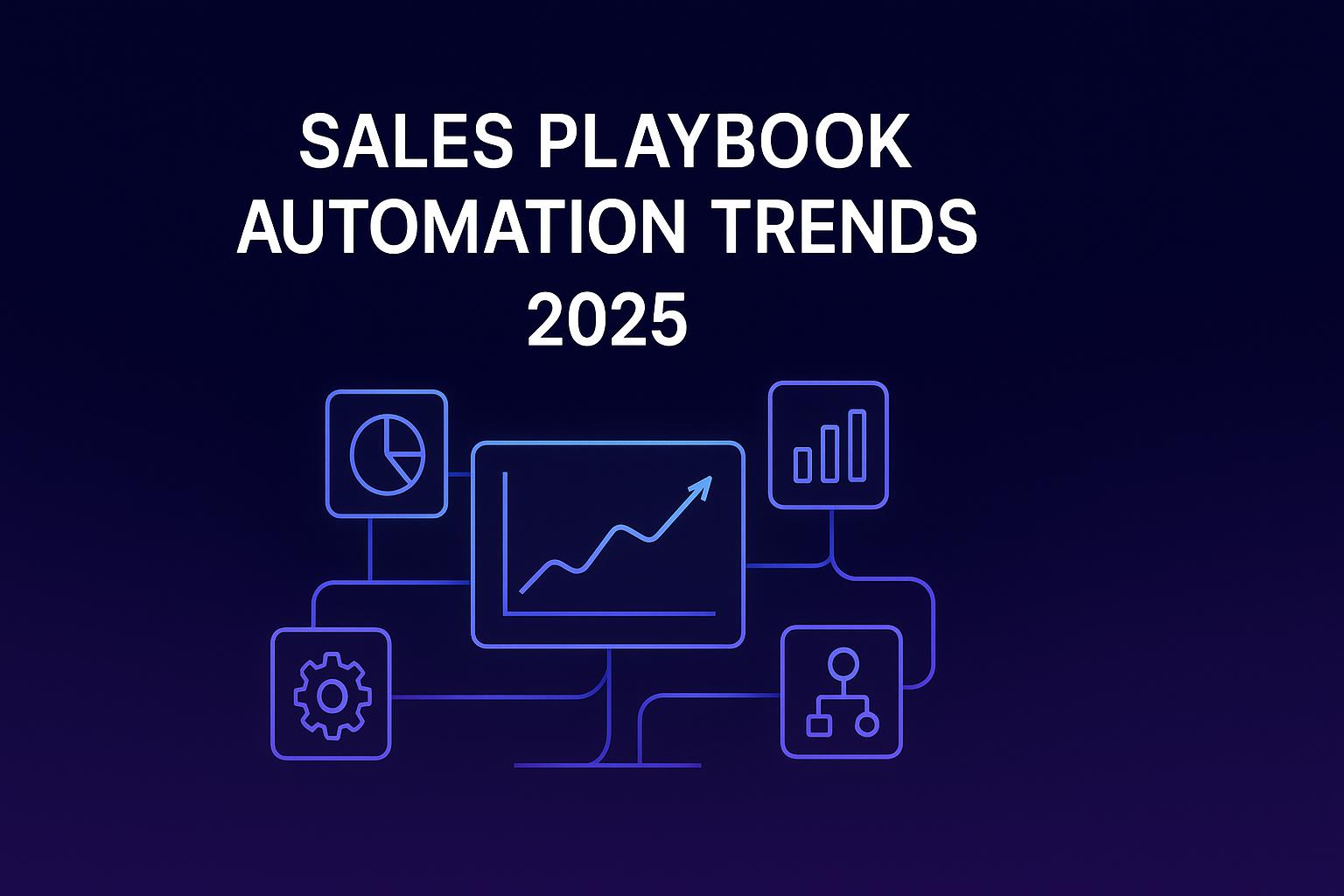

Sales playbook automation is transforming how sales teams operate in 2025. By integrating AI with CRM systems, these tools provide real-time, personalized guidance, enabling sales reps to adapt quickly to buyer needs and market trends. The result? Higher win rates, improved efficiency, and better lead prioritization.
Here’s what you need to know:
- AI is central: 74% of sales professionals believe AI will reshape their roles this year. Companies using AI report 35% higher win rates and 50% greater efficiency in lead prioritization.
- Dynamic playbooks: Unlike static guides, automated playbooks adjust in real time based on buyer behavior, ensuring personalized outreach at scale.
- Market impact: By 2025, digital channels will drive 80% of B2B sales engagements, and 60% of companies will adopt AI-driven selling.
Key tools leading this shift include HubSpot, Salesforce, Outreach, Salesloft, Gradient Works, Highspot, Flowla, and PipelineRoad. Each offers unique features like AI-powered recommendations, predictive analytics, and seamless CRM integrations. While costs vary, most platforms charge $50–$300 per user monthly. Choosing the right tool depends on your team’s size, goals, and technical setup.
Quick Tip: Focus on automating repetitive tasks while keeping human connections intact for meaningful buyer engagement.
The Art of Growth: Creating a Timeless Sales Playbook for 2025
1. HubSpot Sales Hub
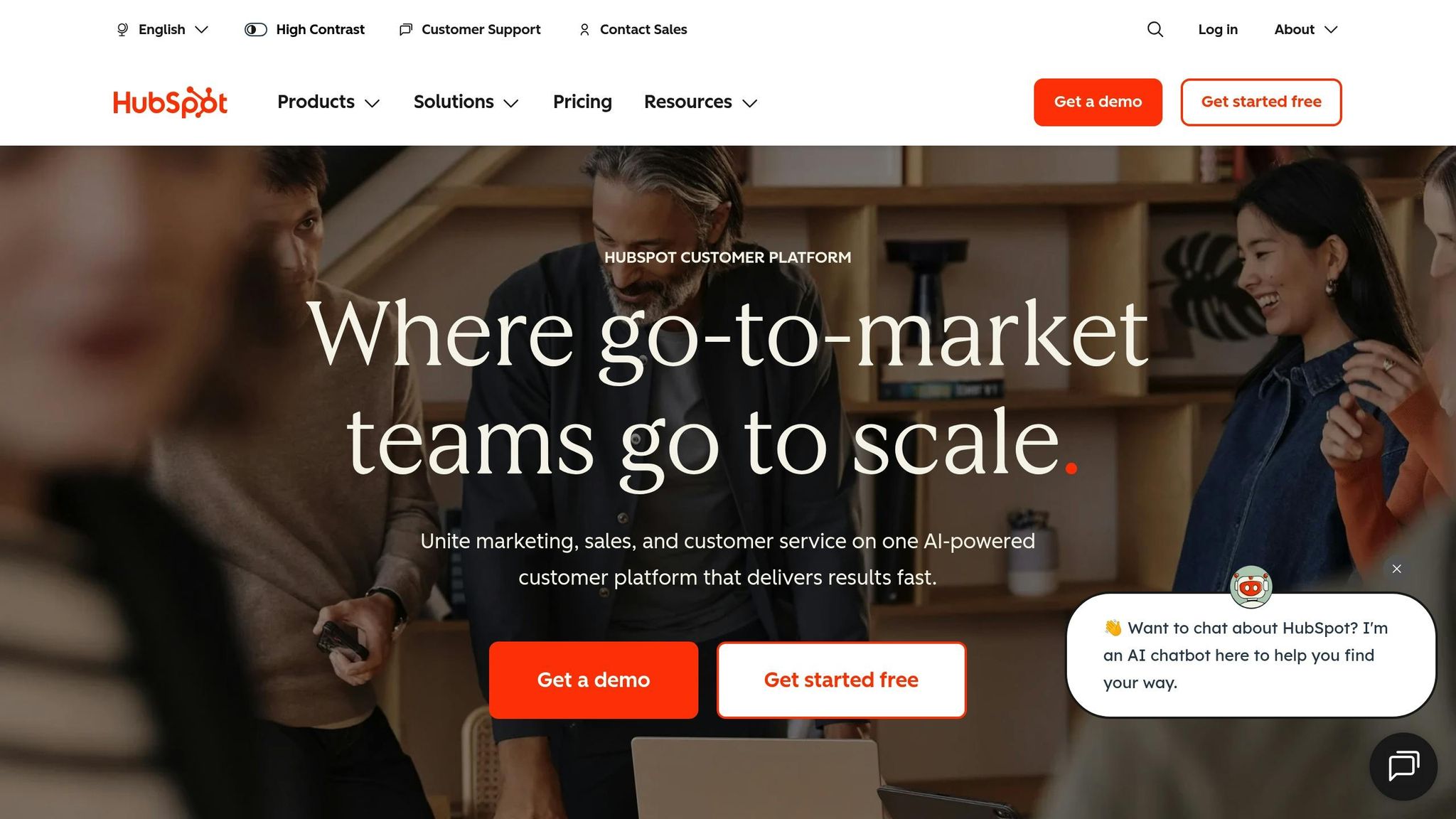
HubSpot Sales Hub offers a robust solution tailored to revolutionize how B2B SaaS companies manage sales playbook automation. With AI-driven tools and seamless integrations, it’s designed to help businesses modernize their sales processes effectively.
AI and Automation Capabilities
HubSpot goes beyond simple email templates with its AI-powered sales assistants. These tools handle tasks like automated call transcription, CRM data enrichment, and predictive lead scoring. By analyzing interactions in real time, they suggest the next best actions, helping sales teams stay ahead.
The dynamic playbooks feature is a standout for companies juggling multiple product lines. These playbooks adapt on the fly based on deal specifics and prospect behavior. For example, if a prospect shows interest in a particular feature, the system delivers tailored messaging and resources instantly.
HubSpot also takes deal forecasting to the next level with predictive analytics. By examining historical data, pipeline activity, and engagement trends, the platform generates accurate revenue projections. This helps sales managers allocate resources wisely and plan quotas with confidence.
Integration Options
One of HubSpot’s strengths is its ability to integrate with hundreds of third-party tools, including marketing platforms, customer support systems, and finance applications. The platform’s open API and extensive marketplace allow for custom integrations, ensuring smooth data flow across your entire sales tech stack.
For teams using tools like Slack or Zoom, HubSpot simplifies workflows by enabling reps to update deals, access data, and trigger actions without switching between apps. This unified approach eliminates data silos, speeding up complex B2B sales cycles.
These integrations also make it easier to scale operations as your business grows.
Scalability for B2B SaaS
HubSpot Sales Hub is built to grow with your organization. It offers customizable pipelines to support different product lines, customer segments, and sales strategies. Whether adding new products or entering new markets, teams can configure workflows quickly without disrupting ongoing processes.
The platform handles scaling effortlessly, whether you have a small team of five reps or a large operation with 500. Its advanced reporting tools evolve alongside your business, delivering insights that are just as useful for analyzing individual performance as they are for spotting company-wide trends.
Cost-Effectiveness
HubSpot’s tiered pricing model lets companies scale their investment as they grow:
| Plan | Price (Annual) | Key Features |
|---|---|---|
| Starter | $20/user/month | Basic automation, email tracking, meeting scheduling |
| Professional | $100/user/month | Advanced automation, predictive lead scoring, custom reporting |
| Enterprise | $150/user/month | AI-powered insights, advanced workflows, custom objects |
All prices are in U.S. dollars and billed annually.
By consolidating CRM, email automation, call tracking, and reporting into one platform, HubSpot helps reduce the total cost of ownership. Many users report efficiency gains of 10–15% and noticeable sales improvements.
A key advantage of HubSpot is that its advanced AI features are available starting at the Professional tier, making sophisticated automation accessible even to smaller teams that aren’t ready for enterprise-level investments.
The platform consistently scores 4.5–4.7 out of 5 stars on major review sites. Users often highlight its user-friendly interface and powerful automation tools. While some note the higher cost at the enterprise level and a learning curve for setting up complex workflows, most find these challenges manageable as their teams become more comfortable with the system.
2. Salesforce AI Co-pilot Features
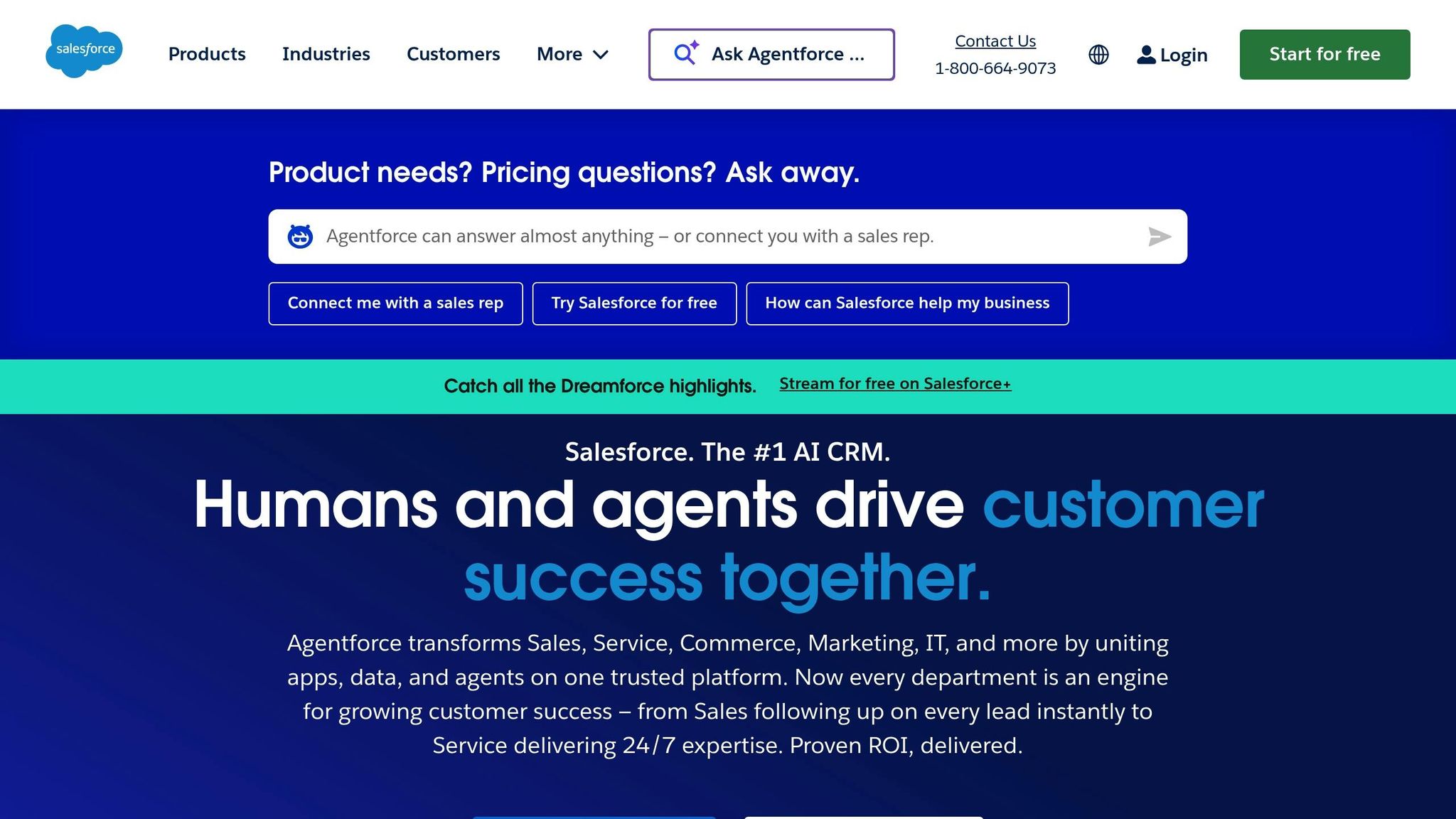
Salesforce's AI Co-pilot takes sales playbook automation to the next level by integrating both generative and predictive AI into its CRM platform. Designed for B2B SaaS companies aiming to scale their sales operations, it offers advanced automation that goes far beyond simple task management.
AI and Automation Capabilities
The AI Co-pilot combines two powerful AI engines to redefine how sales teams work. The generative AI engine focuses on content creation, such as drafting personalized emails, proposals, and playbooks. It draws on historical data and best practices to tailor these materials. Meanwhile, the predictive AI engine excels at forecasting deal outcomes, scoring leads, and pinpointing high-priority opportunities.
Another standout feature is its real-time call transcription and automated CRM updates. It captures key points from live conversations and suggests actionable next steps, ensuring no detail is overlooked. The adaptive scoring system is also noteworthy - it continuously evaluates deals in real-time by analyzing engagement patterns, buyer behavior, and past outcomes, making it far more dynamic than traditional static lead scoring models.
Integration Options
Salesforce's real strength lies in its ability to integrate seamlessly with other tools. With its extensive AppExchange marketplace and open API architecture, the platform connects effortlessly to sales engagement tools, marketing automation software, and third-party data providers. This ensures that automated playbook actions work smoothly across your entire sales tech stack.
Additionally, Salesforce offers native integrations with communication tools like Slack, Zoom, and Microsoft Teams. This allows sales reps to access AI-driven insights and automate workflows directly within these apps, eliminating the need to constantly switch between platforms. For B2B sales cycles that often involve multiple stakeholders, this unified approach simplifies complex processes and keeps everything running efficiently.
Scalability for B2B SaaS
Thanks to its cloud-based architecture, Salesforce can grow alongside fast-expanding SaaS companies. Features like dynamic territory management, adaptive account assignments, and automated workflows help maintain operational consistency as teams scale. For businesses with intricate sales processes, tools like multi-tier approval workflows and customizable automation rules ensure flexibility while adapting to changing requirements.
Cost-Effectiveness
Salesforce's AI Co-pilot operates on a tiered pricing model, with costs ranging from $25 to over $300 per user per month, depending on the package and additional AI features selected. While the initial investment may seem higher than some standalone solutions, the platform's comprehensive automation capabilities often deliver strong returns by improving efficiency and streamlining operations.
| Investment Level | Monthly Cost Range | Key AI Features |
|---|---|---|
| Professional | $25-$75/user | Basic AI insights, automated data entry |
| Enterprise | $100-$200/user | Advanced predictive analytics, custom AI workflows |
| Unlimited | $200-$300+/user | Full AI Co-pilot suite, unlimited automation |
Pricing is in U.S. dollars and may vary based on specific feature needs and contract agreements.
Early adopters have reported efficiency gains of 10–15% and noticeable increases in sales performance. By consolidating multiple tools into a single platform, companies not only reduce software expenses but also improve data consistency and speed up their sales pipelines - key factors contributing to the platform's strong return on investment.
3. Outreach
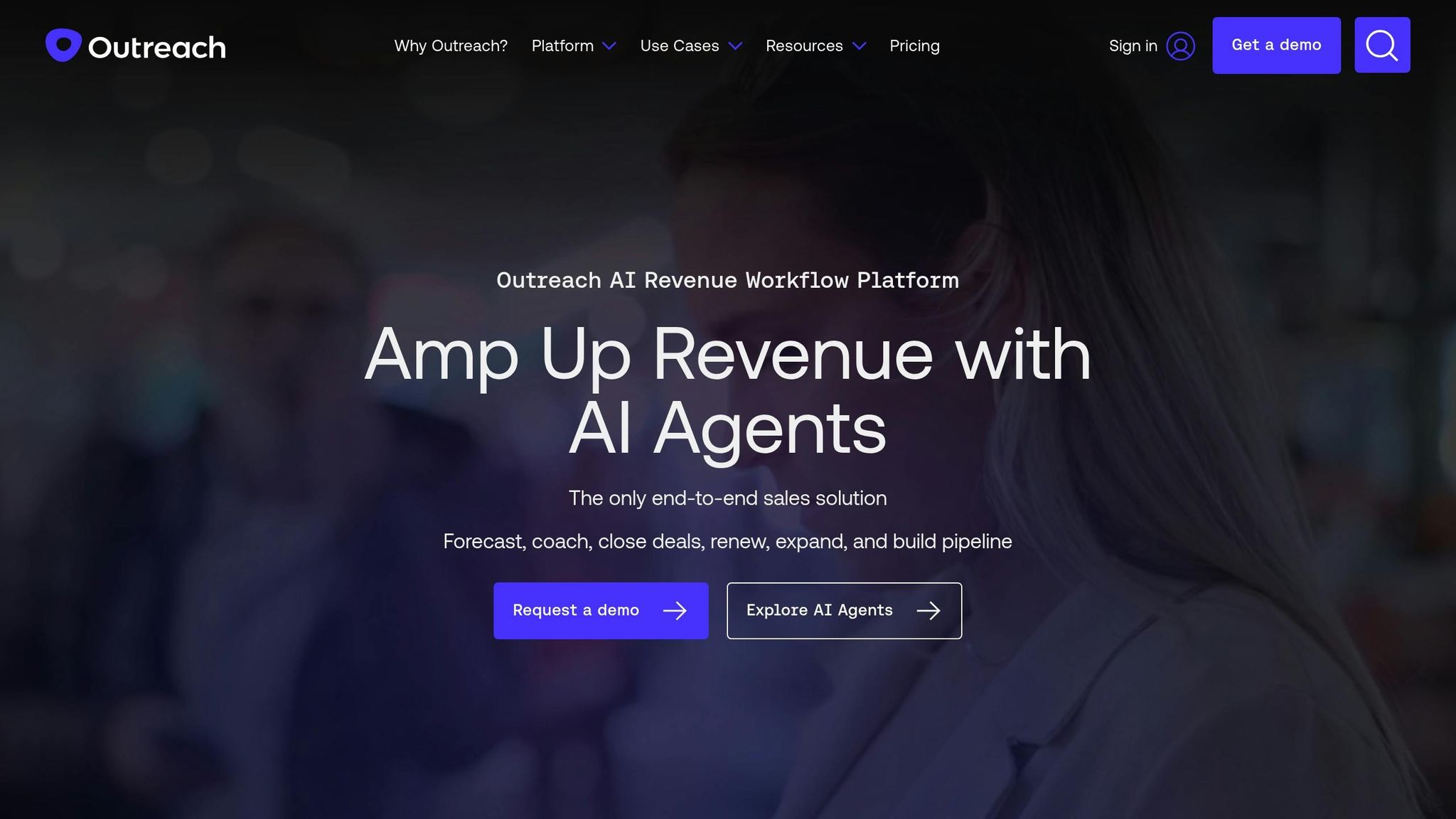
Outreach simplifies the complex world of sales playbooks by automating workflows while keeping a personal touch - a must for B2B SaaS companies. Unlike basic automation tools, Outreach adapts dynamically to buyer behavior and team performance, ensuring every interaction feels intentional and timely.
AI and Automation Capabilities
Outreach uses AI to take personalization and efficiency to the next level. Its engine automates tasks like email customization and workflow optimization. The platform's conversation intelligence analyzes sales calls and emails to uncover patterns that drive success. On top of that, its predictive analytics assess deal risks in real time, providing automated coaching and instant feedback to sales reps. Sentiment analysis is another standout feature, tracking email responses and call transcripts to gauge how prospects feel, allowing teams to adjust their strategies based on actual interest levels.
All of these features integrate seamlessly with other tools, creating a powerful, interconnected system.
Integration Options
Outreach excels at connecting with major CRMs like Salesforce and HubSpot, making data flow effortlessly across your tech stack. It automatically logs activities, updates deal stages, and syncs contact details, cutting down on manual tasks. Beyond CRM integration, Outreach links with marketing automation and communication platforms, enabling a fully unified system where sales actions can trigger marketing responses. For companies with unique workflow needs, its API architecture allows for custom integrations, making it a versatile choice for SaaS businesses with specialized tools.
Scalability for B2B SaaS
Designed with B2B SaaS in mind, Outreach’s cloud-based system supports large teams and multi-channel strategies. It offers role-based access controls and customizable workflows, ensuring consistency as companies scale from startups to enterprises. The platform can handle increasing sales activity, manage complex team structures, and automate task distribution - all while maintaining enterprise-grade security, including compliance with GDPR and CCPA. This makes it a reliable solution for handling sensitive customer data across global markets.
Cost-Effectiveness
Outreach’s pricing reflects its advanced AI-driven features, operating on a custom model starting at approximately $100–$150 per user per month for core functionalities. Costs increase for access to advanced AI modules and enterprise-level integrations.
| Plan | Monthly Cost Range | Key Features |
|---|---|---|
| Core | $100–$150/user | Basic automation, CRM sync, email sequences |
| Advanced | $150–$200/user | Conversation intelligence, predictive analytics |
| Enterprise | $200+/user | Custom integrations, advanced security, support |
Pricing is in U.S. dollars and depends on team size and specific feature requirements.
Companies adopting Outreach often see measurable results. For instance, in 2024, a SaaS company implemented its AI-driven playbooks and achieved a 22% increase in qualified meetings while shortening the sales cycle by 15%. Many users report efficiency gains of 10–15% within six months of use. The platform consistently earns high ratings (4.5–4.7 out of 5) on major review sites, with users praising its automation depth and productivity benefits. However, some note a steeper learning curve for new team members and higher costs compared to simpler tools.
4. Salesloft
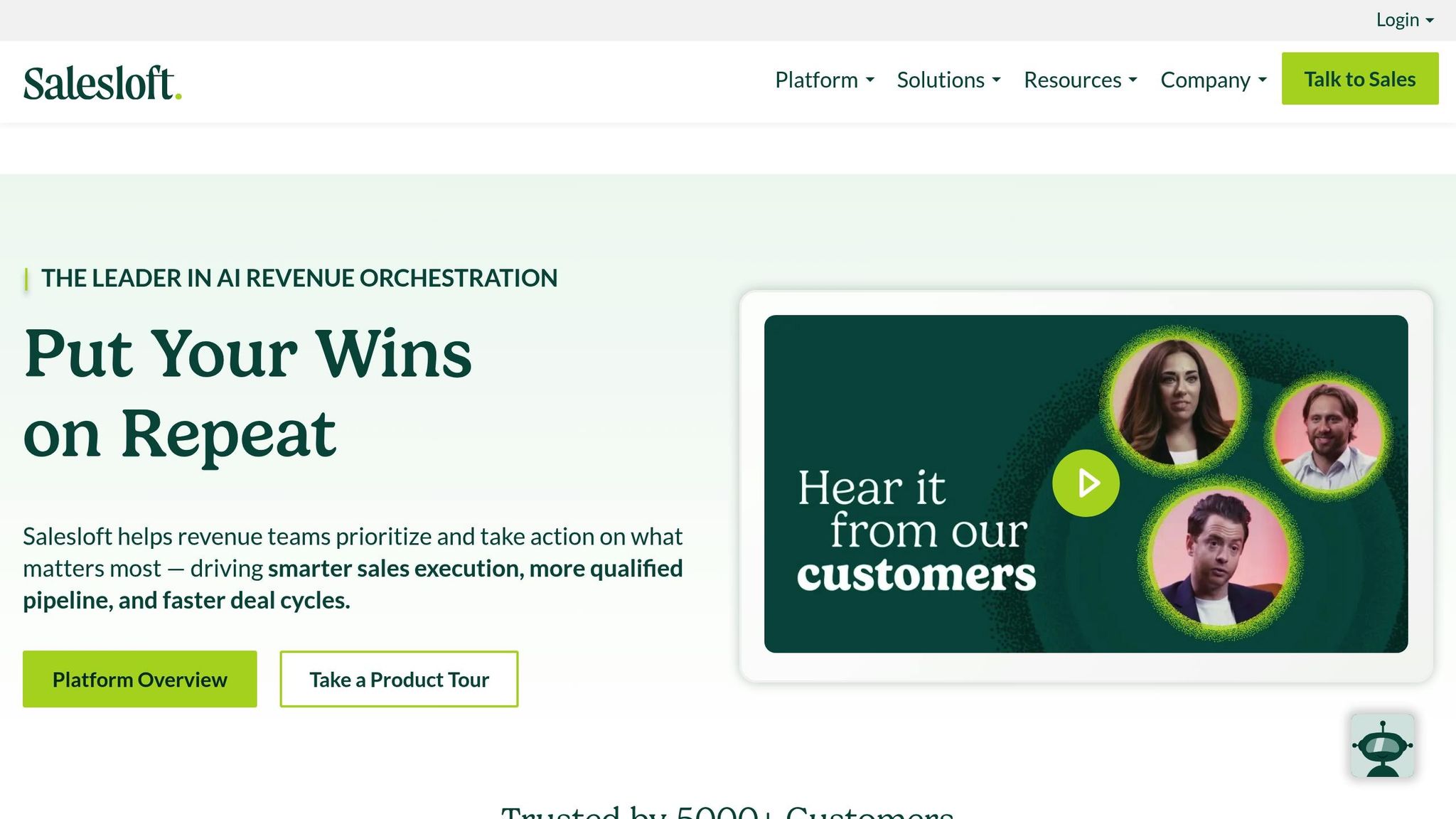
Salesloft is a leading sales engagement platform designed to transform how B2B SaaS sales teams operate. By streamlining tasks and offering AI-driven insights, it helps sales professionals make smarter decisions throughout the buyer journey.
Salesloft places a strong emphasis on AI-powered personalization, seamlessly blending automation with the human touch that is essential for building successful business relationships. The platform not only guides sales teams through structured workflows but also adapts to real-time buyer behavior and market trends. By integrating AI and automation, Salesloft helps boost sales efficiency while maintaining a personal connection.
AI and Automation Capabilities
Salesloft's AI engine provides predictive analytics to help sales teams focus on the leads most likely to convert. By analyzing buyer behavior, past interactions, and communication preferences, the platform suggests the next best steps for each prospect.
Its conversation intelligence feature reviews calls and emails to identify what works best and where improvements can be made. Sales reps receive real-time feedback, enabling them to refine their strategies during live interactions.
The platform also automates key tasks like follow-up communications, scheduling calls, and setting reminders. It dynamically adjusts timing and messaging based on how prospects respond, ensuring outreach remains timely and relevant.
Integration Options
Salesloft integrates effortlessly with top CRMs like Salesforce, HubSpot, and Microsoft Dynamics, syncing contact details, deal stages, and activity logs automatically. It also works with tools like Outlook, Gmail, and various marketing automation platforms. Through open APIs, Salesloft connects with other specialized SaaS tools, creating a unified workflow that reduces duplicate data entry and improves data accuracy.
Scalability for B2B SaaS
Salesloft’s cloud-based design makes it suitable for businesses of all sizes, from startups to large enterprises. The platform offers role-based access controls, customizable workflows, and support for complex approval processes, making it adaptable to growing teams. As companies expand, Salesloft ensures consistency with standardized sales playbooks while allowing for adjustments based on product lines, market segments, or geographic regions. Additionally, it includes robust security features, such as GDPR and CCPA compliance, to meet the needs of global organizations.
Cost-Effectiveness
Salesloft uses a subscription pricing model, starting at $100–$125 per user per month for its core features. Advanced plans offer additional AI tools, analytics, and integrations, with pricing tailored for larger deployments.
| Plan Level | Monthly Cost Range | Core Features |
|---|---|---|
| Core | $100–$125/user | Basic automation, CRM sync, email sequences |
| Advanced | $125–$175/user | AI insights, conversation intelligence, analytics |
| Enterprise | $175+/user | Custom integrations, advanced security, dedicated support |
Prices are in U.S. dollars and may vary based on team size and contract terms.
Salesloft consistently receives high ratings, averaging 4.5 out of 5 stars on major review platforms. Users often praise its ability to increase productivity and simplify sales processes. Research shows that automation platforms like Salesloft can improve sales team efficiency by 10–15% within the first year of use. Many organizations report reduced manual data entry and more consistent outreach efforts, resulting in a strong return on investment, even with its premium pricing.
5. Gradient Works Dynamic Books
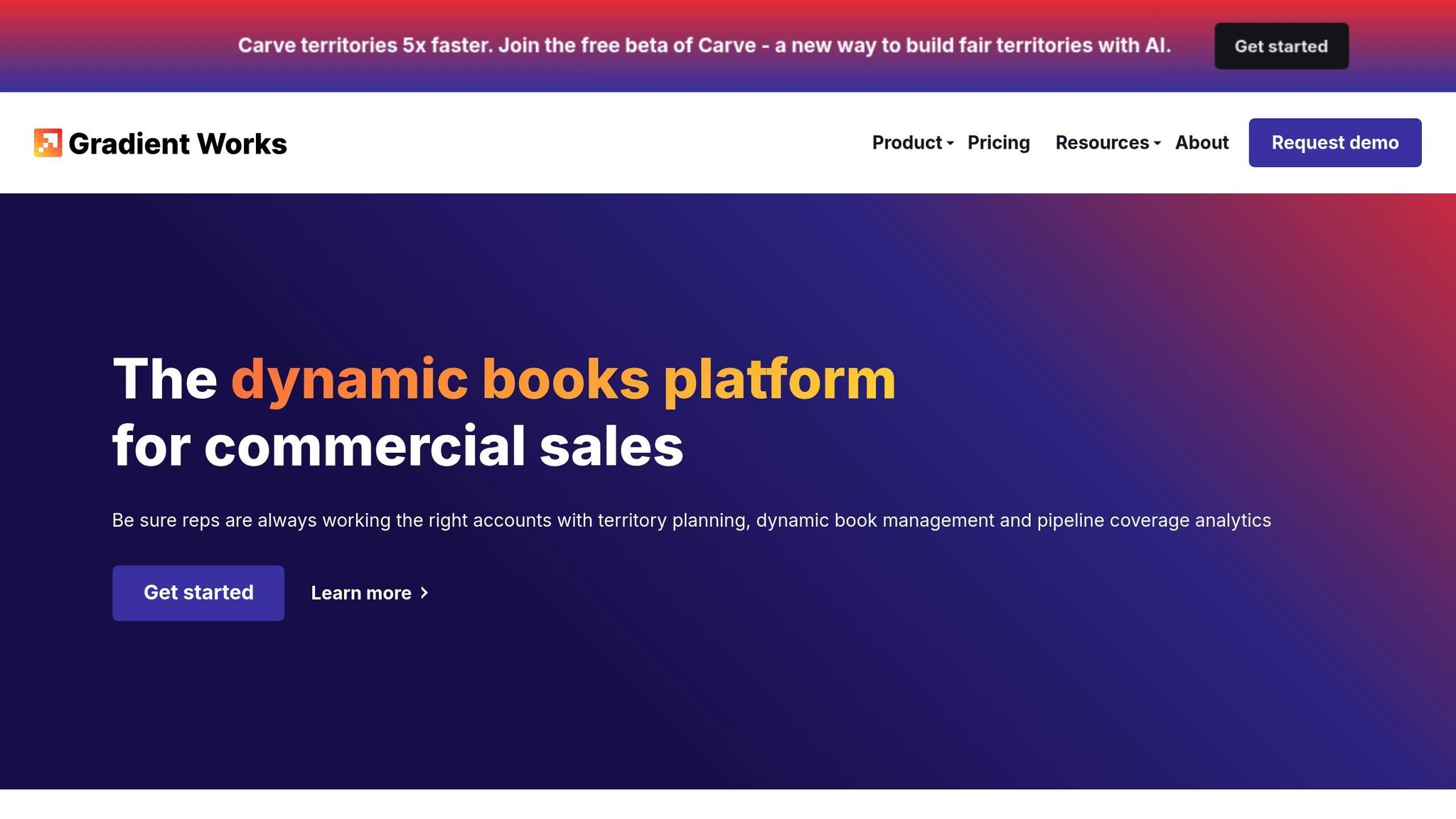
Gradient Works transforms traditional static playbooks into a more responsive solution for territory and account management. Its Dynamic Books platform uses live data to automatically rebalance territories and assign accounts, ensuring sales reps focus on the most relevant opportunities. Unlike static playbooks that need constant manual updates, this system evolves in real time, making it a perfect fit for businesses aiming to stay agile in changing markets.
The platform is designed to adapt to shifts in market conditions, team capacity, and customer profiles. With Gradient Works, your sales strategy automatically grows and adjusts alongside your business, eliminating the inefficiencies that come with outdated, static systems.
AI and Automation Capabilities
Gradient Works leverages AI to streamline territory management by segmenting markets, refining customer profiles, and improving outbound strategies. Its predictive analytics engine prioritizes leads, helping teams zero in on high-conversion opportunities. At the same time, it reduces manual tasks like account research, territory adjustments, and assignment updates.
Research shows that AI-driven sales automation can boost sales leads by 50%, cut call times by 60%, and reduce costs by 60%. By automating these tactical processes, Gradient Works frees up sales reps to focus on building relationships and closing deals.
Integration Options
The platform integrates directly with major CRM systems, ensuring real-time data synchronization across your sales tools. With native connectors for platforms like Salesforce and flexible APIs for custom setups, Dynamic Books keeps account assignments and playbooks updated within your existing systems. This eliminates the hassle of switching between multiple tools, letting your team work more efficiently.
Designed for B2B SaaS Growth
Dynamic Books is built to scale with B2B SaaS organizations of all sizes. Whether you're a startup with a small team or an enterprise with a distributed sales force, the platform adjusts account assignments and sales strategies instantly. In fact, 70% of salespeople report increased productivity when using AI tools.
Cost-Efficiency
While Gradient Works hasn’t disclosed specific pricing, the platform is marketed as a cost-conscious solution for B2B SaaS companies. By automating territory management and improving sales productivity, it helps teams meet their quotas without overextending resources. On average, AI-driven automation delivers a 10–15% boost in sales efficiency, while also cutting hidden costs tied to manual processes - providing savings that go beyond the subscription fee.
sbb-itb-ab67128
6. Highspot
Highspot aligns with the growing trend of AI-driven sales tools, offering a smart solution for content automation. It takes static sales playbooks and transforms them into dynamic, AI-powered tools. By centralizing sales assets and recommending tailored content automatically, Highspot ensures sales reps have the right materials for every stage of the sales process. This approach minimizes manual effort, keeps messaging consistent, and helps teams quickly adapt to evolving buyer needs.
What makes Highspot stand out is its ability to scale personalized buyer experiences. Instead of wasting time searching through outdated folders, sales teams can rely on the platform to surface relevant content based on the deal stage, buyer persona, and past engagement. This functionality lays the groundwork for its advanced AI and automation features.
AI and Automation Capabilities
Highspot uses AI throughout its platform to recommend content, personalize sales guidance, and analyze engagement data. It provides real-time content suggestions, automatically updates playbooks, and uses predictive analytics to identify strategies that drive success. These tools free up sales reps to focus on high-value tasks, ultimately boosting win rates.
The platform also offers AI-driven coaching by analyzing sales conversations and content usage patterns. For example, when a rep moves into a new deal stage, Highspot suggests the most effective playbooks, battle cards, or presentation materials based on successful past deals. This eliminates guesswork and ensures every team member delivers consistent messaging.
Research shows that companies using AI-powered sales tools like Highspot can achieve up to 35% higher win rates and 50% more efficient lead prioritization. Highspot's analytics suite provides detailed insights into content performance, buyer engagement, and sales team effectiveness, empowering teams to make data-informed decisions.
Integration Options
Highspot’s integration capabilities ensure seamless workflows. It connects with major CRMs, marketing tools, and collaboration platforms like Slack through robust APIs. These integrations allow Highspot to deliver content recommendations directly within the tools sales teams already use, eliminating the need to switch between applications during active deals.
This interoperability is especially beneficial for organizations juggling multiple tools for lead generation, customer communication, and revenue operations. Highspot’s integrations help maintain efficiency without disrupting established processes.
Scalability for B2B SaaS
Highspot is built to grow alongside businesses, offering features like detailed access controls and centralized content management. Its cloud-based design ensures quick onboarding and instant updates for distributed teams.
The platform is ideal for both mid-sized and large enterprise SaaS companies experiencing growth. As teams expand across regions or product lines, Highspot balances consistent messaging with localized customization. This makes it especially useful for B2B SaaS companies managing diverse market segments or geographic needs.
Highspot consistently earns ratings between 4.6 and 4.8 out of 5 on platforms like G2 and Capterra. Users often highlight its intuitive interface, powerful search tools, and AI-driven recommendations. Additionally, it meets enterprise compliance standards, including SOC 2 and GDPR.
Cost-Effectiveness
Highspot doesn’t publicly share pricing details but typically provides custom quotes based on company size, feature needs, and deployment scale. Industry estimates suggest starting costs of $50–$80 per user per month for core features, with additional fees for advanced AI and analytics. This pricing positions Highspot competitively in the enterprise sales enablement market.
Its automation features deliver measurable ROI by reducing manual tasks and increasing sales efficiency. AI-driven sales tools like Highspot have been shown to increase sales leads by 50%, cut call times by 60%, and reduce associated costs by another 60%. For many businesses, the investment in Highspot quickly pays off through greater productivity and improved conversion rates. US-based companies also benefit from transparent billing in dollars and clear contract terms.
7. Flowla Agentic Playbooks
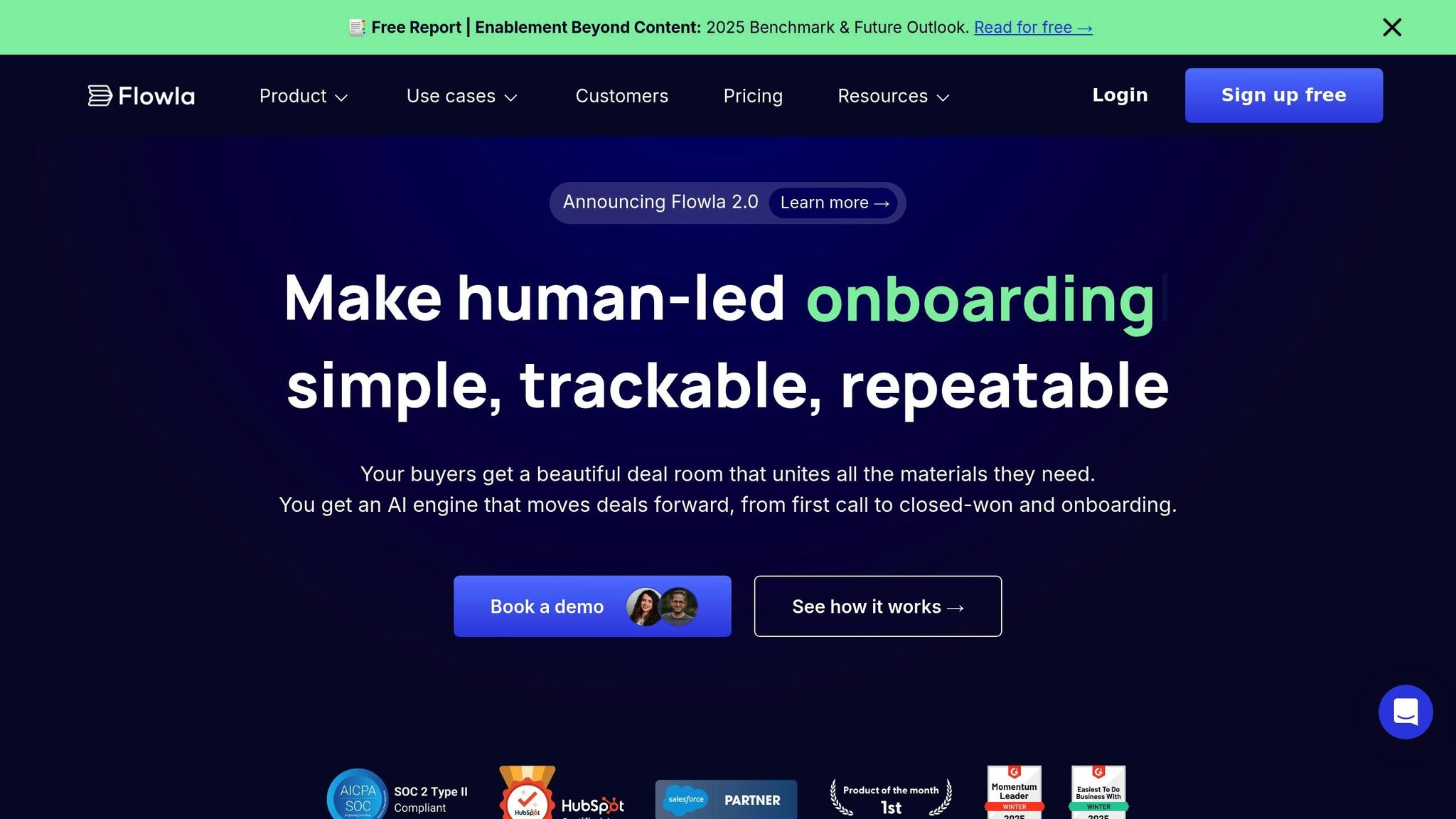
Flowla is transforming how sales teams use playbooks by integrating agentic AI technology. Unlike traditional tools that stick to rigid, pre-set rules, Flowla's platform employs AI that makes decisions and takes actions autonomously. This means sales workflows become smarter and more responsive, adapting to the unique demands of each deal rather than relying on static playbooks.
With Flowla, sales teams get more than just advice - it automates decision-making and handles complex tasks, all while keeping things straightforward and free of unnecessary tech jargon.
AI and Automation Capabilities
The heart of Flowla’s platform is its autonomous AI engine, which guides sales teams through intricate deal cycles without requiring constant input. It handles repetitive tasks, offers real-time recommendations, and adjusts strategies based on buyer engagement and deal progress.
This AI takes personalization to the next level. It crafts tailored outreach, creates contextual sales content, and optimizes workflows using historical data. By automating these processes, sales reps can dedicate more time to building meaningful client relationships. Plus, the system continuously learns from past successes, refining its suggestions for future deals.
Flowla doesn’t stop at recommendations - it takes action. The platform autonomously executes follow-ups, updates deal stages, and activates workflows based on buyer behavior, all without manual effort.
Research has shown that advanced AI automation, like Flowla’s, can significantly improve both efficiency and sales performance.
Integration Options
Flowla’s power lies in its ability to integrate seamlessly with popular CRMs and sales tools. It connects with platforms like Salesforce, HubSpot, and Outreach through native connectors and API access, ensuring smooth data sharing and workflow automation.
These integrations eliminate data silos, enabling sales teams to access Flowla’s features directly within their existing tools. This seamless connectivity not only simplifies adoption but also ensures that automation workflows draw from comprehensive data, leading to smarter decisions.
Scalability for B2B SaaS
Flowla is built to scale with fast-growing B2B SaaS organizations. As team sizes, territories, or product lines expand, the platform dynamically updates playbooks to keep pace. It supports large, distributed teams across multiple time zones, maintaining consistent messaging and performance even during high deal volumes.
Cost-Effectiveness
Flowla offers subscription-based pricing in U.S. dollars, with options for monthly or annual billing. While specific pricing details aren’t publicly listed, quotes are tailored to team size and feature needs.
The platform’s cost-effectiveness comes from more than just competitive pricing. By automating complex decisions and reducing the need for multiple standalone tools, Flowla helps companies save time and improve win rates. For U.S.-based SaaS businesses, the transparent pricing and clear contract terms make it a smart investment that drives both efficiency and ROI, shifting automation from an operational cost to a strategic advantage.
8. PipelineRoad
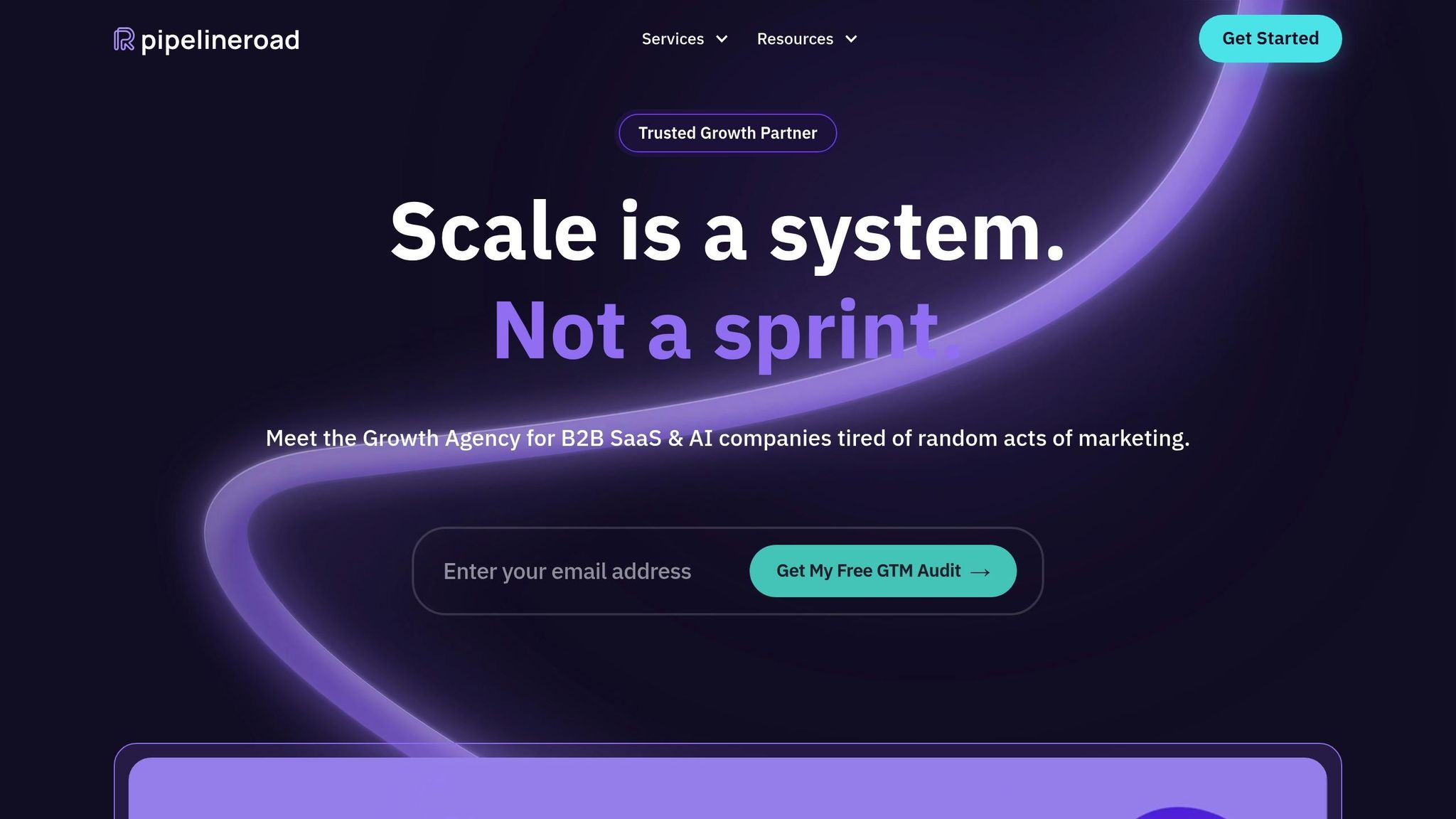
PipelineRoad combines B2B marketing expertise with RevOps automation to provide tailored solutions for AI and SaaS companies. Their focus is on delivering full-service sales playbooks through strategic planning, implementation, and ongoing refinement. As businesses navigate the challenges of 2025, PipelineRoad's approach stands out by addressing shifting sales dynamics with advanced AI tools and seamless system integration.
What makes PipelineRoad distinct is its emphasis on fractional leadership and a structured Go-To-Market (GTM) roadmap. This strategy reshapes how growing companies approach sales automation, making it a valuable resource in the ever-evolving, AI-driven sales environment. Below, we’ll explore their core capabilities, integration options, scalability, and cost advantages.
AI and Automation Capabilities
PipelineRoad harnesses the power of AI and automation to streamline CRM management, enhance data enrichment, and refine analytics - creating optimized sales playbooks. Their AI-driven account-based marketing (ABM) tools have delivered tangible results, including a 30% boost in engagement rates through automated campaigns. These advancements align with broader industry trends, where AI is projected to increase sales leads by 50%, reduce call times by 60%, and cut costs by another 60%.
What truly sets them apart is their ability to craft strategic playbooks tailored to each client’s unique needs. These playbooks help B2B SaaS companies define their Ideal Customer Profile (ICP), refine messaging, and develop effective communication strategies. Jasmine Bhatti, Founder of NaviNurses, shares her experience:
"The final workbook we got from them has been invaluable. Every time we onboard someone new, I just send it to them. It clearly explains who we serve, how we talk to them, and why."
Integration Options
PipelineRoad prioritizes seamless integration with existing tech stacks, guided by a structured GTM roadmap. This process begins with discovery audits and strategic planning to ensure smooth data alignment. They support major platforms like Salesforce, HubSpot, and Outreach through APIs and pre-built connectors, eliminating data silos and enabling unified reporting.
Mike Williams, VP of Commercial Operations, underscores the impact of these integrations:
"Their MarketingOps team has truly changed the way we manage our CRM."
Scalability for B2B SaaS
PipelineRoad offers a modular service model designed to grow alongside a company’s needs. This approach accommodates increasing data volumes, complex workflows, and expanding teams. By providing fractional leadership, they deliver senior-level expertise without the costs of full-time hires. This flexibility is especially beneficial for companies looking to pivot or scale quickly. Arthur Argyropoulos, Founder of CabFare, highlights this value:
"I get a whole team with the skillset I need at the moment I need it."
For growing SaaS companies, scaling efficiently is about more than just adding headcount - it’s about building systems that grow with them. Matt Fruge, Partner at SquareDash & CapOut, emphasizes:
"They're the perfect partner for companies approaching product-market fit who need to go faster, but aren't ready to hire a team."
Cost-Effectiveness
PipelineRoad’s fractional leadership model and modular services provide expert automation solutions without the expense of full-time staff. Their phased, results-driven approach ensures resources are used efficiently, maximizing ROI for U.S.-based SaaS businesses. Jon Rydberg, Founder of Align Advisory Group, shares his experience:
"PipelineRoad isn't just offering one-size-fits-all pricing. They gave us phased options, did real due diligence, and had a summary of findings that showed they understood the business."
This approach turns automation into a strategic advantage rather than just an operational expense. With 74% of sales professionals expecting AI to redefine their roles, companies using AI in sales enablement report 35% higher win rates and 50% better lead prioritization. PipelineRoad’s comprehensive services make them a smart choice for businesses seeking sustainable growth in an AI-driven future.
Advantages and Disadvantages
Sales playbook automation tools come with their own set of strengths and limitations, making it essential for organizations to choose solutions that align with their needs, budget, and growth plans.
The world of sales automation tools varies widely in terms of AI capabilities, integration depth, scalability, and pricing. While some platforms shine with features like seamless CRM integration, others focus on specialized functionalities such as dynamic territory management or autonomous playbook execution.
| Tool | Key Advantages | Primary Disadvantages | Best For |
|---|---|---|---|
| HubSpot Sales Hub | Strong marketing integration, predictive analytics, and mid-range pricing with good ROI | Lacks advanced AI coaching features compared to premium options | Growing companies seeking a combined CRM and marketing solution |
| Salesforce AI Co-pilot | Advanced AI forecasting, extensive ecosystem, and proven scalability for enterprises | High complexity, premium pricing, and requires significant setup | Large enterprises with complex sales processes and dedicated IT resources |
| Outreach | AI-powered engagement automation, scalable, and flexible CRM integration | Integration can be challenging; costs rise with advanced features | Mid-market companies focusing on outbound sales efficiency |
| Salesloft | Effective cadence AI, strong analytics, and flexible pricing tiers | Requires significant customization for best results | Sales teams prioritizing structured engagement workflows |
| Gradient Works Dynamic Books | Helps manage territories dynamically and improve quota attainment without overwhelming reps | Niche focus with a learning curve; cultural adaptation may be needed | Organizations optimizing territories and rep capacity |
| Highspot | AI-driven content recommendations and strong content platform integration | Lacks deeper workflow automation found in full-stack solutions | Teams with content-heavy sales processes needing advanced enablement tools |
| Flowla Agentic Playbooks | Reduces manual effort with autonomous AI and agentic technology | Newer technology with adoption challenges and limited track record | Teams ready to explore autonomous sales processes |
| PipelineRoad | Tailored automation for AI/SaaS companies, strategic GTM roadmaps, and fractional leadership support | Service-based model rather than pure SaaS; success depends on client readiness | AI and SaaS companies looking for a comprehensive automation strategy |
Key Considerations
When evaluating these tools, pricing is often a major factor. Most platforms operate on tiered SaaS pricing models, typically ranging from $50 to $150 per user per month for enterprise-level solutions. However, indirect costs - like training, integration, and change management - can significantly influence the total cost of ownership.
AI sophistication is another critical differentiator. While many platforms offer similar AI-driven features, the depth of capabilities varies. For example, Salesforce AI Co-pilot and HubSpot Sales Hub excel in predictive analytics and automated content generation. Meanwhile, newer tools like Flowla Agentic Playbooks push boundaries with autonomous playbook execution. According to industry data, companies using AI report 35% higher win rates and 50% more efficient lead prioritization, making AI capabilities a key factor in decision-making.
Integration is equally important but can pose challenges. Tools like Salesforce and HubSpot, with deep CRM integration, can eliminate data silos but may lock organizations into specific ecosystems. On the other hand, specialized solutions like Gradient Works Dynamic Books and Outreach offer robust APIs but often require more technical expertise to implement effectively.
Over-automation is a growing concern. While AI tools can boost sales leads by 50% and cut call times by 60%, relying too heavily on automation can lead to impersonal customer interactions and missed opportunities for meaningful engagement. The best implementations strike a balance between automation and authentic human touchpoints.
Scalability is another advantage of cloud-based SaaS solutions, as most platforms grow alongside an organization. However, the ease of scaling varies. All-in-one platforms tend to offer smoother scalability, while specialized tools may require additional integration work as teams expand.
Ultimately, the most effective choice depends on aligning the tool's features with your organization's technical capabilities, readiness, and long-term goals - rather than simply opting for the platform with the most features.
Final Recommendations
As we look toward 2025, sales automation is evolving around AI-driven personalization, dynamic territory management, and autonomous execution of playbooks. To stay ahead, it’s essential to align your strategy with your team’s current capabilities and readiness.
Start by evaluating your automation readiness. If you’re just beginning, focus on integrating core CRM functionalities and automating routine tasks. Tools like HubSpot Sales Hub offer a great starting point, combining CRM and marketing features in one platform. For advanced teams, solutions such as Salesforce AI Co-Pilot can enhance forecasting, while Flowla Agentic Playbooks can handle autonomous task automation.
Choose tools that address your specific challenges. For territory management, consider Gradient Works Dynamic Books, which enables real-time account rebalancing. If your sales process relies heavily on content, Highspot uses AI to provide tailored recommendations for sales enablement. Teams prioritizing outbound efficiency might find platforms like Outreach or Salesloft invaluable for engagement automation.
Budget for the full cost of ownership. Beyond the initial purchase, factor in expenses for implementation, training, and ongoing change management. Complex solutions often require dedicated IT support, so plan accordingly to avoid unexpected hurdles.
Maintain a balance between automation and human connection. While AI can increase sales leads by 50% and reduce call times by 60%, over-reliance on automation risks making interactions feel impersonal. The best strategies automate repetitive, low-value tasks while reserving key moments for human engagement to build meaningful relationships.
Ensure integration capabilities are a priority. Smooth data flow is critical for success. All-in-one platforms like HubSpot and Salesforce help eliminate data silos, while more specialized tools will require strong API integration strategies to ensure seamless operations.
For AI and SaaS companies, PipelineRoad offers a structured go-to-market framework that blends sales automation with broader revenue operations and marketing support - addressing the unique demands of scaling in these industries.
Ultimately, success in sales automation hinges on focusing on high-impact features. Begin with clear objectives, automate tasks that directly contribute to sales outcomes, and track your progress with well-defined KPIs. As your team becomes accustomed to new workflows, gradually expand your automation efforts to achieve even greater efficiency.
Strategic automation that complements human expertise will be a game-changer in 2025. Choose tools that enhance your team’s strengths and tackle your operational challenges head-on.
FAQs
How does AI-powered sales playbook automation enhance win rates and help prioritize leads for sales teams?
AI-powered tools for automating sales playbooks can make a big difference in boosting win rates. These tools provide sales teams with real-time insights and personalized strategies designed for each prospect. By sifting through massive amounts of data, AI uncovers patterns and suggests the best actions, making sure sales reps always have the right approach at their fingertips.
On top of that, AI helps teams prioritize leads by scoring them based on key factors like engagement levels, conversion potential, and overall value. This means sales teams can focus their energy on the most promising opportunities, working smarter and achieving better results.
What should B2B SaaS companies look for in a sales playbook automation tool?
When choosing a sales playbook automation tool for a B2B SaaS company, it’s crucial to focus on features that boost efficiency and align with your specific business objectives. Opt for tools that include AI-powered insights, effortless CRM integration, and the flexibility to adapt workflows to match your sales strategies.
It’s also wise to prioritize platforms that support growth scalability, offer strong analytics for monitoring performance, and feature intuitive interfaces to encourage swift team adoption. These elements can help simplify your operations and support consistent revenue growth over time.
How do tools like HubSpot and Salesforce work with existing sales systems to improve automation and efficiency?
Platforms such as HubSpot and Salesforce are built to work effortlessly with your existing sales tools. They bring everything together - CRMs, email platforms, and analytics tools - into one place, simplifying workflows and making operations more efficient. By centralizing data and cutting down on repetitive tasks, these platforms help teams communicate better and stay on the same page.
What’s more, many of these integrations use AI-driven automation to dig into customer behavior, tailor outreach efforts, and fine-tune sales processes. The result? Sales teams can spend less time on administrative work and more time building meaningful connections and closing deals.
Related Blog Posts

sustainable revenue channels.







